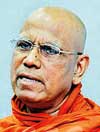Reply To:
Name - Reply Comment
Last Updated : 2024-04-19 20:44:00

Most students in our country will now look forward to the end of the first school term. But for a majority of schoolboys, it is that time of the year for permissible mischief and mayhem (all in the name of prestige and pride of course). Although the name suggests a single match, the Big Match is far from a solitary experience.
Big matches are annual cricket encounters between traditional rival schools played between the months of February and April. A fine tradition built over the decades to hone cricketing abilities of boys’ schools, big matches are no longer just an event in school calendars. The ordinary pedestrian and motorist too have to keep note of the days and venues to avoid finding themselves in the midst of a joyous celebration. If a pedestrian inadvertently happens to tread along one of these colourful parades, they may come across anything, from schoolboys draped in massive flags with tribal motifs on their faces to caparisoned elephants and sometimes even elderly gentlemen dancing their way  around kids old enough to be their grandchildren.
around kids old enough to be their grandchildren.
While this is business as usual for most city folk, a group of leading Buddhist prelates took offense at this disturbing trend and voiced their opposition, demanding that big matches be banned. Their statements came following a violent clash between two leading boys’ schools in Colombo early February, which resulted in over a dozen students being hospitalised.
The monks claimed that the event acted as a platform to promote alcohol and derogatory behaviour. In response to this call, Education Minister Akila Viraj Kariyawasam said big matches cannot be banned as it was not a practical move to tackle student discipline. The minister added that the demands were not new as there have been numerous pleas to ban such events which have become a serious concern. However, the minister stated that discussions with school principals were underway to take preventive measures to tackle possible violence among students during the impending school sports season.

When it comes to the big match season, Sri Lanka has all kinds of battles. We have battles in colour; the battles of the blues, golds, and even maroons. We have got the battles of the hills, Ruhuna and Kotte, invoking warrior status to school cricketers. And yes, in Sri Lanka, even Saints are set for battle. Like the word suggests, what we often witness is unfortunately an unhealthy rivalry leading to an exchange of fisticuffs and obscenities. Minister Kariyawasam said recently that he had discussions with school principals to see how best they could curb violence. He said they have instructed law enforcement agencies to take action to minimise incidents which cause public inconvenience during big matches.
Meanwhile, the police have also called for discipline at big matches, warning those participants that they intended to stamp out unruly behaviour.
Addressing the media at the Criminal Record Division (CRD) in early February, Police Spokesman DIG Priyantha Jayakody said the police did not attempt to take stern action during previous traffic law violations by students. He added that he could not allow such violations to continue.
“The police will not hesitate to use the law against students making a nuisance of themselves,” he said.
However, when the Daily Mirror contacted Deputy Inspector General of Police (Traffic) Palitha Fernando to query his stance on the matter, he said he had not received specific instructions to handle traffic violations reported during the big match season. A clear communication gap between the police departments was further apparent when DIG Fernando assured the Daily Mirror that there was no special disruption in traffic during the big match hype. If at all a communiqué was issued by the Police Chief, it is now evident that it had not reached the Traffic Department of the police.
 Ven. Omalpe Sobitha Thera
Ven. Omalpe Sobitha Thera “I did not demand that the big matches be banned. But I maintain that they should be banned if the schools and those involved in these activities cannot maintain their discipline or civil behaviour,” the Thera said.
Ven. Sobitha Thera also maintains that big matches are platforms to promote alcohol and drugs adding that past pupils should accept responsibility of misleading the youth.
“We are not protesting revelry and celebration. Yet, we must protest when old boys act as old beasts. Instead of setting an example to the younger generations, they use this opportunity to engage in various activities that are detrimental to youngsters and a nuisance to the general public. How ironic is it when liquor licenses are issued for big matches where there are underage youth present. Principals and old boys are responsible for this despicable trend,” the Thera added.
Ven. Sobitha Thera further noted that research have suggested a majority of local youth have experimented with their first cigarette during the big match season in school. Lamenting on the disappointing finding, the Thera questioned the effect a school parade or rally will have on the result of the match that is being played between two schools.
“Recently, I witnessed a school rally in the Kegalle town which halted traffic for hours. Two helicopters carried the school flag over the town. Why can’t this wasteful expenditure be used to make better sanitation facilities in their own schools?” the Thera questioned.
Referring to the recent brawl between two popular schools in Colombo, he said this was a problem that needed to be addressed urgently.
“These are two prominent Buddhist schools of the country. What examples will they set? Self-discipline is common to all religions and therefore we must all strive to encourage it. What is regretful is that the authorities have turned a blind eye towards the problem. Parades cause inconvenience to the general public, they utter filth and disturb the peace, while breaking all traffic rules,” the Thera stated.
Ven. Omalpe Sobitha Thera also said he would take legal action against the police and other authorities over the neglect of their duties. Ven. Sobitha Thera said he resorted to legal action as relevant authorities failed to take any action to prevent malpractices carried out under the guise of big matches in schools.
“I will file a case against the police for the willful neglect and omission of their duties,” the Thera concluded.
 Joseph Stalin
Joseph Stalin “Big matches should not be banned. It is a part of the school culture. Some schools have played against each other for many years with some over a century and they cannot be scrapped away just like that. Sri Lanka is accustomed to a system where education is restricted to passing the Grade 5 scholarship, ordinary and advanced level examinations. The authorities are only concerned with the pass percentage of exams. When Bandula Gunawardena was the Education Minister, this was his vision. Unfortunately, it has not changed with the present government,” Stalin said. He believes that the banning of big matches will not help the students in personality development.
“Education is not exam-centric. What we strive for as educators is to give the society a balanced human being at the end of their education in school. This cannot be done without their involvement in these activities. These events teach them the valuable lessons of team spirit, winning and losing and even respect for their alma mater. Most importantly, pupils must enjoy school and for school to be enjoyable, these events are a necessity.
“We respect the views of the venerable prelates. However, it should be noted that the present day big match culture is limited to the big schools in the cities. This must change. Big matches should reach the village schools too. The proper co-ordination of these events is a responsibility of the Education Ministry. It must ensure that all children enjoy such occasions during their schooling career,” he added.
“Unfortunately, big matches are no longer within the control of the schools. Past Pupils Associations of most schools have influence over these events and as a result, the poor students are misled. Past pupils have a need to participate in matters of the school and come up with various ideas to cater to an adult audience. What happens is that children in schools are misled that these adult activities are what the big match is for. This is a serious problem and we completely agree with the prelates who raised their concerns,” Weerasinghe said. Speaking of the parades and rallies, Weerasinghe said they should be banned completely.
“The match should be restricted to the pitch and the students who take part in it. Parades and rallies should not take place on the roads. School principals are perfectly capable of controlling the students, together with their teachers and parents. However, merriment at these matches spin out of control when these PPAs are involved as we have no control over them.
“Furthermore, these events are limited to the ‘mega’ schools in the cities. When cash rich Old Boys’ Unions have leverage over schools, the event which is meant to be for the students become entertainment for the old boys. Therefore, the influence of old boys in these events must be restricted,” Weerasinghe opined.
The big match arena has been traditionally reserved for males. The only part where girls were involved was when groups of unruly boys force their way or ‘jump’ into popular girls’ schools and run around creating a racket. The ‘innocent’ practice has caused much debate over the recent years and has caused greater misery for principals and teachers of girls’ schools. Not only do they have to worry about the safety of the girls but sometimes also pay for paint jobs to cover graffiti left on the walls. This year, with a historic big match played between two girls’ schools in Panadura, more girls schools are proving that they too have what it takes to be part of the spectacular sport.
While many pros and cons can be weighed against each other, big matches are an intrinsic feature of the school culture and the loyalty to one’s alma mater is yet another Lankan quirk. When cricket is part and parcel of the Sri Lankan spirit, one cannot expect our youth and those well past youth to take things lightly. It calls for celebration, revelry and a healthy dose of rivalry. There are many who benefit from the increased commercialisation of the event. Wasteful expenditure between the firecrackers and t-shirts (and even the after parties) can be categorised as individual choices. What cannot be simply ignored is the promotion of alcohol among youngsters and the authority’s inability to enforce the law when the general public is inconvenienced. Let’s hope that the big match season of 2017 is where it all ends. More importantly, calling for bans -- which has now become a national past-time -- is certainly not the solution to mould a generation of disciplined and balanced youth.

 “Banning these cricket matches is not the solution. The points the prelates have highlighted are common malpractices present in society, not just in school. These problems must be addressed with a national plan. As someone just out of school, I think the promotion and sale of alcohol and narcotics in and around schools must be dealt with first.”
“Banning these cricket matches is not the solution. The points the prelates have highlighted are common malpractices present in society, not just in school. These problems must be addressed with a national plan. As someone just out of school, I think the promotion and sale of alcohol and narcotics in and around schools must be dealt with first.”
“I think the big match is not just a day for celebrating sportsmanship or talent. I have been to a  couple of Roy-Tho matches. Its a way of meeting old friends, being young and going back to those old days. And I think it’s even cool to see two girls’ schools coming up with the concept out of which I belong to one of them.
couple of Roy-Tho matches. Its a way of meeting old friends, being young and going back to those old days. And I think it’s even cool to see two girls’ schools coming up with the concept out of which I belong to one of them.
 “It is an important part of a sub-culture. I believe the good outweighs the bad. It’s a part of the child learning curve towards adolescence. And at the end of the day, it reflects the spirit of sport.”
“It is an important part of a sub-culture. I believe the good outweighs the bad. It’s a part of the child learning curve towards adolescence. And at the end of the day, it reflects the spirit of sport.”
“The big match season is where all the school students, past pupils and girls from nowhere join to  celebrate an event which is at best annoying to the general public. Especially when the parade starts, literally parts of the city are jammed with slow-moving vehicles and people behaving like animals on the road.”
celebrate an event which is at best annoying to the general public. Especially when the parade starts, literally parts of the city are jammed with slow-moving vehicles and people behaving like animals on the road.”
 “Big matches are needed to uphold spirit of sportsmanship. The match is organised by two schools and it’s an opportunity to build interpersonal skills. But with increased commercialisation, these events should not be influence by external forces. When Old Boys come to a match, along with them come the beer. There is no discipline before or after the match. We need a change of our attitudes to change these practices.”
“Big matches are needed to uphold spirit of sportsmanship. The match is organised by two schools and it’s an opportunity to build interpersonal skills. But with increased commercialisation, these events should not be influence by external forces. When Old Boys come to a match, along with them come the beer. There is no discipline before or after the match. We need a change of our attitudes to change these practices.”
“I think youth nowadays should be aware of discipline and sportsmanship. Wreaking havoc, causing a  great nuisance to the public and disrupting traffic does not contribute in any way for their team to win the game. Some may say that this is what boyhood is all about and chalk it down to youthful mischief. And what about the property damages and public brawls? They ultimately tarnish the good reputation of their own schools.”
great nuisance to the public and disrupting traffic does not contribute in any way for their team to win the game. Some may say that this is what boyhood is all about and chalk it down to youthful mischief. And what about the property damages and public brawls? They ultimately tarnish the good reputation of their own schools.”

Add comment
Comments will be edited (grammar, spelling and slang) and authorized at the discretion of Daily Mirror online. The website also has the right not to publish selected comments.
Reply To:
Name - Reply Comment
On March 26, a couple arriving from Thailand was arrested with 88 live animal
According to villagers from Naula-Moragolla out of 105 families 80 can afford
Is the situation in Sri Lanka so grim that locals harbour hope that they coul
A recent post on social media revealed that three purple-faced langurs near t